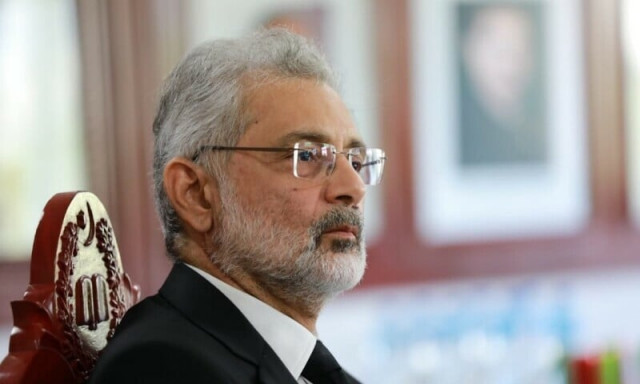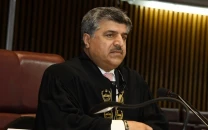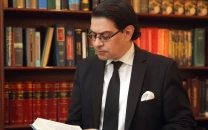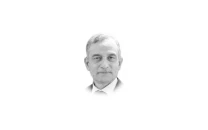Inside CJP Qazi Faez Isa’s Supreme Court: A year of judicial challenges and political turbulence
An exemplary relationship between CJP Isa, the executive, and superior bars has been observed over the past year.

Like previous years, the Supreme Court, led by Chief Justice of Pakistan Qazi Faez Isa, has played a key role in shaping national politics during the outgoing judicial year (2023-24).
The new judicial year will start tomorrow (Monday), during which Chief Justice Isa, representatives of superior bars, and the Attorney General for Pakistan will deliver their speeches.
It has been observed that there has been an exemplary relationship between CJP Isa, the executive, and the superior bars over the last year.
The apex court has been pivotal in ensuring the general elections in 2024. The Supreme Court compelled all stakeholders to announce the election date, resulting in the general elections being scheduled for February 8.
However, CJP Isa has faced criticism for the January 13 order, which declared PTI’s intra-party election illegal, subsequently depriving the party of its election symbol.
This decision has raised concerns over the fairness of the 2024 general elections.
PTI chief Imran Khan was convicted in three cases before the general elections, without following due process.
The superior judiciary, notably, did not intervene in the alleged manipulation of judicial proceedings in Khan’s cases before the election.
Despite all efforts, the February general election results were not favorable for powerful circles, and PTI continues to raise questions about the final results.
The functioning of Punjab election tribunals remains suspended by a larger bench led by CJP Isa. PTI has already approached the Supreme Court, requesting the formation of a judicial commission to investigate the alleged rigging in the elections.
The petition is still pending.
CJP Isa recently upheld the Election Commission of Pakistan’s decision to recount election results in three constituencies, which resulted in PTI losing three National Assembly seats.
The current government is at ease with CJP Isa's leadership. However, there is concern that after his retirement, the continuity of the present system may be jeopardized.
To address this, the government is pushing for a judicial reform package through a constitutional amendment, including a proposal to extend the retirement age of judges, including CJP Isa, by three years to maintain the current system.
However, many judges are apprehensive about this proposal, fearing it would undermine the judiciary's independence.
The Supreme Court’s July 12 short order has created an obstacle for the government’s constitutional amendment.
After the election results, Islamabad High Court judges raised concerns about the manipulation of judicial proceedings. Six IHC judges sent a letter to the Supreme Judicial Council on March 25, seeking guidance on the interference of agencies in judicial matters.
Instead of acting against the alleged interference, the Supreme Court under CJP Isa referred the matter to the government for the formation of an inquiry commission.
When former Chief Justice Tassaduq Hussain Jilliani declined to head the commission, the Supreme Court initiated suo motu proceedings, during which other high courts also admitted the interference of agencies. The case is still pending.
CJP Isa has yet to publicly endorse the stance of the six IHC judges on agency interference.
The judges have been subjected to a malicious campaign, and even former Lahore High Court Chief Justice Malik Shahzad Ahmad Khan was targeted through a social media smear campaign.
These attacks on independent judges have continued because the Supreme Court, led by CJP Isa, has failed to create deterrents against such interference.
Judicial Politics
Judicial politics has continued to dominate the superior judiciary throughout the outgoing judicial year.
Like other sectors of society, the Supreme Court has seen sharp polarisation, weakening its ability to handle high-profile, sensitive cases.
The court became divided after the presidential reference against Justice Isa in May 2018. During CJP Isa's tenure, two judges associated with former CJP Umar Ata Bandial were removed from office.
Mazahar Ali Akbar Naqvi was dismissed for misconduct, and Justice Ijaz ul Ahsan resigned without providing reasons.
Since the July 12 order, the Supreme Court has been divided along new lines. Relationships among senior SC judges are strained, and judicial politics remains tied to national politics.
Despite over a year having passed, the Supreme Court has yet to make a final decision on the trial of civilians in military courts. Over 80 PTI activists remain in military custody.
Following the February 8 elections, access to social media platform X (formerly Twitter) has been restricted.
Several journalists who questioned the January 13 order received notices from the FIA at the request of bar representatives.
The Supreme Court has also struggled to address the issue of enforced disappearances. Although CJP Isa hails from Balochistan, no hearings are taking place on the missing persons’ cases in the province.
PTI has expressed complete mistrust in CJP Isa, with party leaders demanding his recusal from their cases. On the other hand, PML-N fully backs CJP Isa. The lifetime disqualification of Nawaz Sharif was lifted before the general elections.
The Supreme Court recently restored amendments to NAB law and resolved the presidential reference regarding former Prime Minister Zulfiqar Ali Bhutto's murder case.
The court also issued three judicial orders in Mubarak Sani’s bail matter.



















COMMENTS
Comments are moderated and generally will be posted if they are on-topic and not abusive.
For more information, please see our Comments FAQ